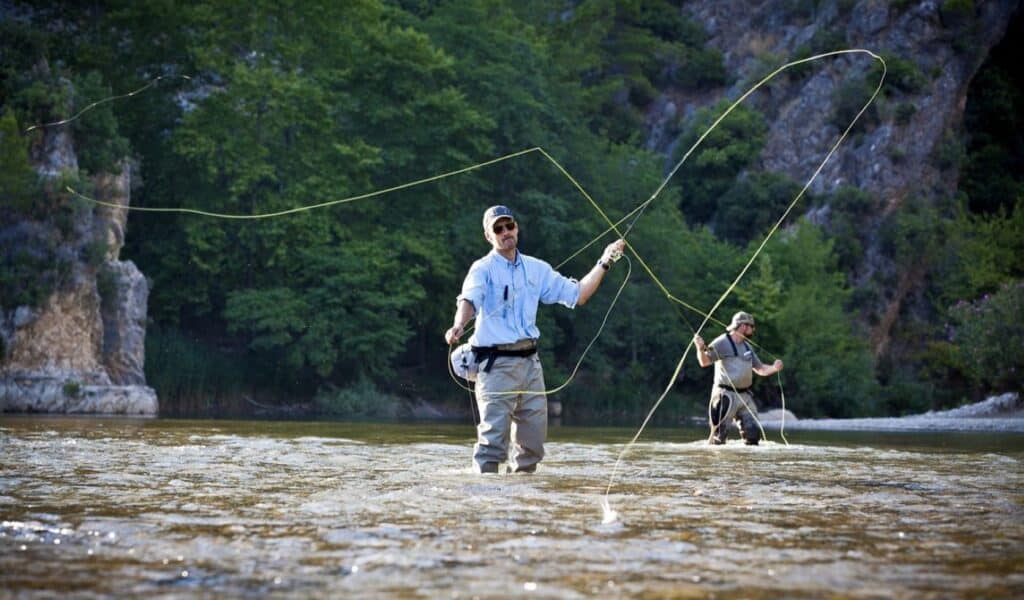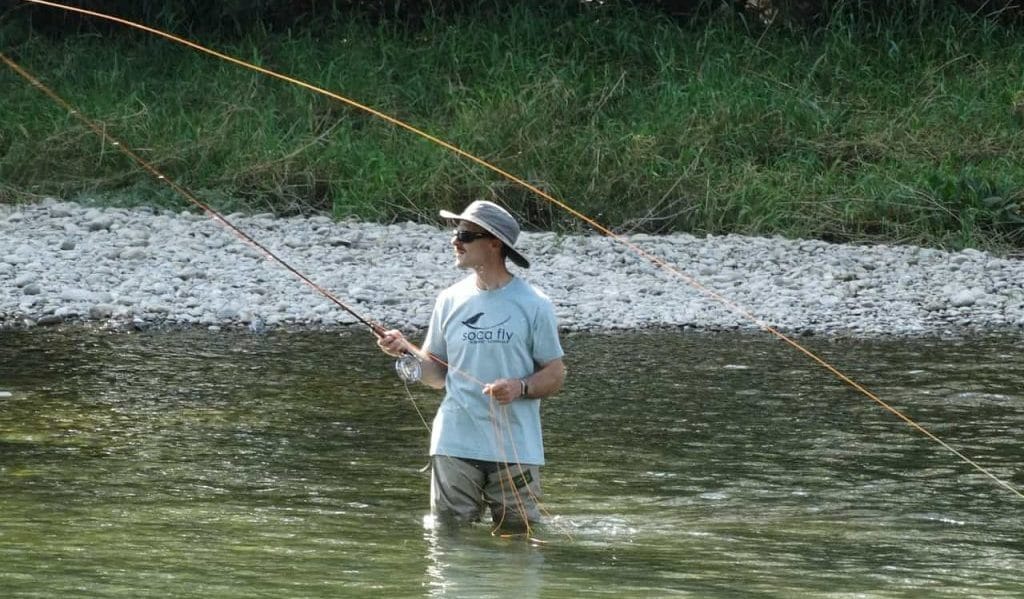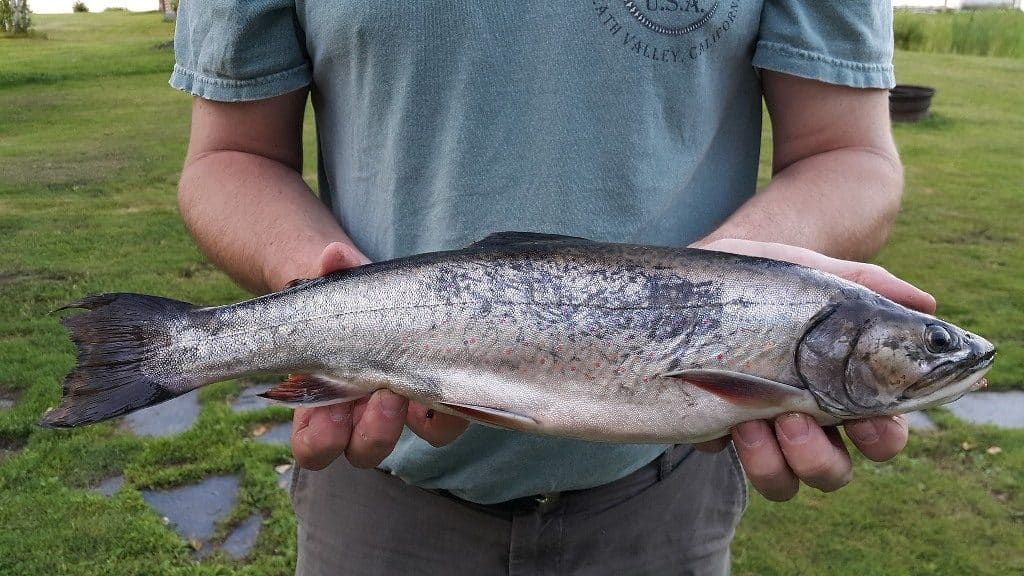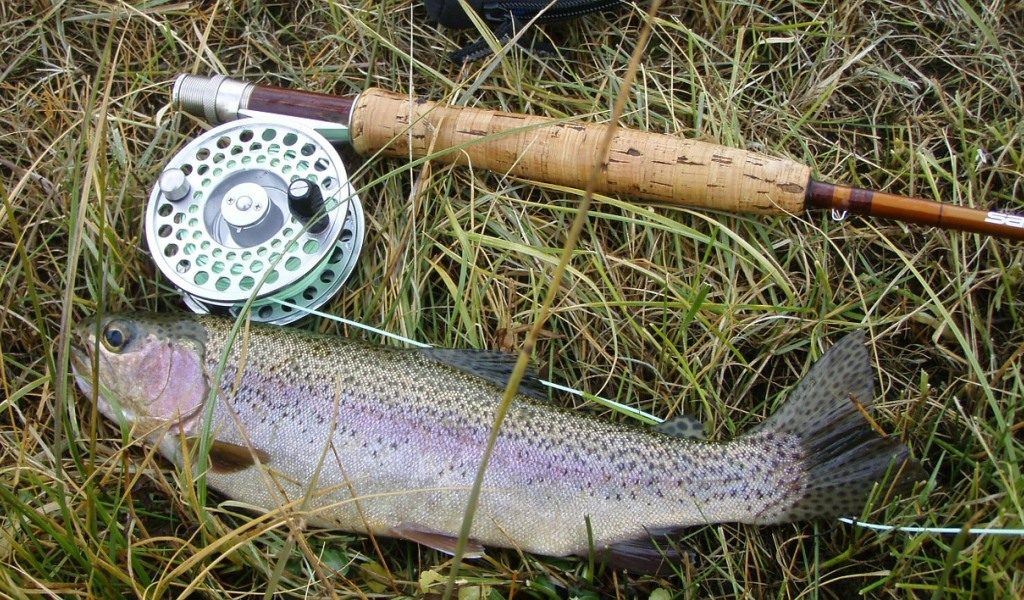The fly fishing vs spin fishing debate is the music every time anglers dine together. While all fishing is thrilling, fishermen often have their preferences.
Some anglers are more enthralled by the experience of being one with water. Yet, others get excited by large fish and more catches.
Both fly fishing and spin fishing have their pros and cons. And both are equally loved by different anglers. But is one way to fish better or more enjoyable?
What is Fly Fishing?
Fly fishing uses an artificial fly to trick a fish. Most flies are made of feathers, hair, or fur so they appear like actual baitfish or insects.
Fly fishermen cast a fly into the water using a fly rod, reel, and a weighted fishing line. You don’t use regular fishing techniques. There are special techniques for fly fishing that need focus and practice.
Fly fishing can be quite more difficult than spin fishing. But like all good challenges, it gradually becomes easy. The fundamental aspect of fly fishing is to accept the challenge and catch the fish the natural way.
Most anglers agree that fly fishing is much more peaceful than all other techniques. The relaxation offered by this method is unmatched. The popular phrase about ‘being one with water’ is true for fly fishing.
You can catch any sort of fish on a fly. Unlike popular belief, it is not suited only for catching trout. It is a versatile way to catch many different species aside from trout.
What is Spin Fishing?
Spin fishing is great for anglers who get excited more by the number of fish they catch. Apart from trout, you can catch a lot of fish better with a spin fishing rod and reel.
The most common lures used for spin fishing are jerkbaits, crankbaits, and tubes. The fans love the amazing efficiency of spin fishing for catching fish with ease.
The casting technique for spinning is quite different from fly fishing. This includes the differences in fishing gear used for both techniques.
Fly Fishing vs Spin Fishing: Key Differences
There are many differences between fly fishing and spin fishing. Let’s look at the 9 key differences.
1. Technique
In fly fishing, an artificial fly is cast toward the target fish by utilizing the weight of the line and the leader. While in spin fishing, the lure is thrown toward the target fish using the weight of the hook and the lure.
Spinning allows you to target a wide area of water in less time. While fly fishing, you need to locate the exact area where there are more fish. It is smarter to go for areas laden with fish food than spread your effort all around.
This is why many experienced anglers prefer fly fishing, especially for catching trout. The main diet of trout fish is bugs and insects. So, you can aim at the areas of water that are rich in such foods. That’s where you will catch most fish.
But, fly fishing is not just limited to trout. There are many species of fish you can catch by locating their food and aiming right.
2. Tactics
In fly fishing, you need to fool the fish using food imitation and presentation. The fish come to the surface once attracted to the imitations of insects on the top of the water. A fly fishing setup mimics the natural way the food is available to the fish.
In spin fishing, you need to lower the lure to different water depths to attract the fish to bite. For this enticement to work, the lure must resemble a food source and the fish must be hungry. The same logic applies to fly fishing also.
But, there is one big disadvantage of spin fishing. The fish often get spooked by the weighted lures at otherwise undisturbed depths. The spinning baits create an impact on the body of water that scares the fish away.
This phenomenon does not occur during fly fishing as the bait is introduced on the water surface. So, there is no impact and the probability of the fish getting scared away is much lower.
3. Rod Type
There is a big difference in the type of rods used for spin fishing and fly fishing. Fly rods are lightweight while the line is heavy. Spinning rods are heavier and use a lightweight line.
In fly fishing, the weighted line, leader, and tippet propel the fly.
Spin fishing uses a monofilament or braided line to casts the heavy lures. The casting line itself is mostly light in weight, although you may need a heavier line depending on the weight of the lure.
4. Flies vs Lures
The basic difference between the two types of fishing can be narrowed down to artificial lures and flies.
The flies used in fly fishing mimic the natural insects the target fish are attracted to. Some of the most common artificial flies are dry flies and wet flies (emergers, nymphs, and streamers).
On the other hand, the lures used in spin fishing are heavier and more technical. They also imitate the natural food the fish normally feed on. But they are heavier and often move to attract the fish faster.
5. Rivers vs Lakes
It is typical for most anglers to fly fish on rivers in the mountains. While most anglers prefer spin fishing on lakes.
But this doesn’t mean you cannot go fly fishing on still water. You can fly fish on still water too. But, anglers do not prefer to spin fish in rivers and other moving water bodies.
6. Location
Anglers need more room in fly fishing to operate and maneuver the line without hindrance from trees or foliage.
On the other hand, you can spin fish even in the smallest portions of the water. You only need good visibility. Even the surrounding foliage poses no threat here.
This is why it may not be possible for you to fly fish in all locations which might be suitable for spin fishing.
7. Cost
Spin fishing is less expensive to start with. You can get a complete set of freshwater spinning gear even for under $100. Quite reasonable for a bucket full of fish at the end of the day, isn’t it?
Fly fishing gear is at least twice as expensive the spinning gear. You need a fly rod, a fly reel, and a weighted fly line. All of these items can increase your total cost. But you can buy a fly fishing combo under $300 if you are on a budget.
The fly fishing gear will ultimately be cheaper when you consider its long-term use. This is especially true for the lures that last years on end if they are of good quality. The lures are much cheaper than spinning lures and help eliminate the difference in cost.
8. Difference in Intent
Most anglers agree that fly fishing allows you to relax and enjoy your day on the water. It requires you to study the flow of water and aim accordingly. This is described as ‘feeling one with the water’ and it is exactly what these fishermen chase.
The core intent of spin fishing is to catch as many fish as possible. It is the way to go if you aim to gather a large amount of fish in your bucket. A full bucket as a prize is what exhilarates anglers to go spin fishing. It is a feat worth celebrating as catching fish is never at all easy.
While the intent to catch more fish is the driving force in spin fishing, it is entirely possible to catch as many fish while fly fishing too.
9. Skill Level
Typically, the art of fly fishing is more difficult to learn than other forms of fishing. A beginner fly fisherman needs more patience and effort to learn how to cast.
Fly fishing is a challenge that anglers love to experience. It is a difficult form of fishing compared to other methods. But this challenge is the whole thrill the sport of fly fishing is built upon.
Spin fishing is easier than fly fishing. This is an edge that spin fishing has over fly fishing. Lures like crankbaits used along with spinning rods give anglers an upper hand. So if you are a beginner, you should start with spin fishing. Once you have some experience, you can move up to fly fishing.
So Which One is Better?
There is no definite answer to this question. But fly fishing seems to have an edge over spin fishing:
- Fly fishing doesn’t scare away the fish with heavy lures the way it often happens in spin fishing.
- Fly fishing is a smarter method as it uses imitations of the food the fish naturally eat.
- Fly fishing lures don’t harm the fish needlessly unlike other sharp lures.
Remember, fish are living creatures and they don’t always behave the same way. Different fish get attracted to different baits at different times.
Last Updated on May 15, 2025 by Blaine Townsend




